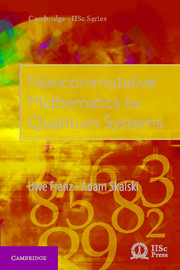Preface
Published online by Cambridge University Press: 18 December 2015
Summary
This monograph arose from the lectures delivered by the authors during the graduate school, being a part of the meeting ’Recent advances in Operator Theory and Operator Algebras’, which took place between 31 December 2012 and 12 January 2013 in the Indian Statistical Institute in Bangalore. We are very grateful to Rajarama Bhat, Tirthankar Bhattacharyya and Jaydeb Sarkar for organizing the meeting, inviting us to speak and providing excellent working conditions during our stay at ISI, and the audience of the school for their active participation in our courses. The authors are strong believers in the usefulness of organizing graduate schools for mathematical students – in fact we first met during an analogous event in Greifswald (Germany) in 2003, respectively, as a lecturer and a participating PhD student, and have collaborated ever since.
Our lectures during the Bangalore school treated notions of independence and quantum Lévy processes in quantum probability (by the first named author) and quantum processes understood as noncommutative incarnations of classical dynamical systems (by the second named author). Both these topics, born from necessity to incorporate quantum models into mathematical approaches to study physical systems, have now become very active, broad areas of modern mathematical research. The monograph consists of two chapters: ‘Independence and Lévy processes in quantum probability’, authored by Uwe Franz, and ‘Quantum dynamical systems from the point of view of noncommutative mathematics’, authored by Adam Skalski. These can be read independently, but we believe that there is an added value in placing them together; not in the least because they present alternative approaches to the noncommutative/quantum generalizations of classical concepts and results. The monograph is essentially self-contained, with several references to both sources of necessary background and to current research literature, and should thus form an appropriate entrance point for graduate students interested in the area.
We would like to express our gratitude to Rajarama Bhat and Gadadhar Misra for encouraging us to transform the lecture notes into the monograph form, and facilitating the contacts with the publisher, Cambridge University Press India, whose assistance during the editing process is also gratefully acknowledged.
Information
- Type
- Chapter
- Information
- Noncommutative Mathematics for Quantum Systems , pp. xi - xiiPublisher: Cambridge University PressPrint publication year: 2016
